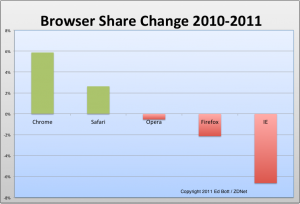Google Chrome continues its rapid rise, IE and Firefox fall

If you’re looking for a tech success story, look no further than Google’s Chrome browser. Introduced less than three years ago, it has soared in popularity among techies and civilians worldwide. And its gains are coming at the direct expense of Microsoft and Mozilla.
You can see the worldwide trend in the latest figures from Net Market Share, which publishes snapshots of web usage based on data from 160 million visits per month to its network (the exact methodology is here). Out of curiosity, I asked the analytics wizards at ZDNet to share the statistics from this site as well.
In combination, those numbers confirm what you probably already suspected: By any measure, Chrome is a mega-hit, and it’s putting a big hurt on Internet Explorer and Firefox.
Here’s the story in a picture, followed by some quick analysis.
How successful has Chrome been?
Worldwide, Net Market Share says usage of Google Chrome almost doubled in the past year, from 7.24% to 13.11%. At ZDNet, which tends to attract a more technically sophisticated visitor, the increase was even more startling, going for 15.0% in June 2010 to 24.4% this summer.
Among other browsers, only Safari has been able to grow over the past year, creeping up roughly 2.6%, largely on the strength of growth in iOS devices. At ZDNet, Safari’s share started higher and its growth was much more modest, going from 9.6% to 10.5%.
Firefox is a net loser over the past year. In the Net Market Share numbers, Mozilla Firefox saw its share decline from 23.8% to 21.7%, Here at ZDNet, the decline was a bit more precipitous, tumbling from 34.4% to 30.9%. That’s a 10% drop in the three years since Chrome appeared.
And finally, there’s the biggest loser, Internet Explorer, which has not been able to reverse its losses. Part of the damage is self-inflicted, because Microsoft chose not to make its latest release, Internet Explorer 9, compatible with Windows XP. The impact? On the Net Market Share scale, IE is in danger of slipping below the 50% mark, sliding in a year from 60.3% to 53.7%. Among the tech-centric ZDNet audience, IE still keeps its plurality, but just barely. Its share has gone from 37.9% to 31.1% over the past year.
Of all the browsers in this group, Firefox is in the most dire straits. Over the years, it has defined itself as the safe alternative to Internet Explorer, and it had that slot all to itself while Microsoft was cleaning up its Vista mess. But now it’s been replaced in that role by Chrome, which has the full weight of Google behind it. Given that Google has been Mozilla’s chief backer through the years, it’s hard to see a bright future for Firefox.
See also:
